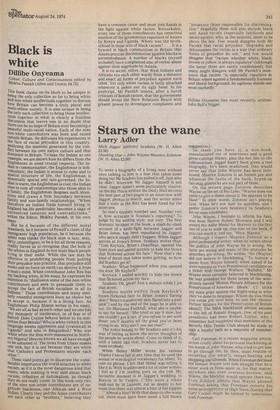Black is White
Dillibe Onyeama
Colour, Culture and Consciousness edited by Bhikhu Parekh (Allen and Unwin £4.75) This book claims on its blurb to be unique in being the only collection so far to bring white and non-white intellectuals together to discuss how Britain can become a truly plural and multi-ethnic society. It is also unique in being the only such collection to bring these intellectuals together in what is clearly a fruitless discussion that leaves one in no doubt that there can be no hope of Britain ever becoming a peaceful multi-racial nation. Each of the nine non-white contributors was born and raised outside Britain. He discusses his experiences in the face of racial prejudice in this country, analysing the tensions generated by the conflict between his own native culture and that dominant in Britain. To take the Indian as one example, we are shown how he differs from the Englishman in some crucial respects. The Indian is communitarian, the Englishman is individualistic; the Indian is averse to rules and to Spatial structure of life, the Englishman is essentially spatial and rule-governed; the Indian is warm, the Englishman is cool; the Indian tries to turn all relationships into those akin to a family, the Englishman despises such intentions and Craws a firm boundary between family and non-family relationships. "When therefore an Indian finds himself living in England his life predictably becomes a saga of Unresolved tensions and contradictions," Writes the Editor, Bhikhu Parekh, in his own essay.
But be it because of the different moral standards, be it because of Powell's claim of the immigrants' high population, be it because the White man thinks the black man is lazy, sexy, dirty, unintelligent, or be it for all three reasons, reality forces us to recognise that the bulk of the whites in England do not want black people living in their midst. While the law may be effective in prohibiting people from putting their prejudice into practice, that prejudice still exists and no force on earth can destroy it from a man's mind. White contributor John Rex has my backing when, in his essay, he expresses his intention to "disillusion some of the non-white contributors and seek to persuade them to accept the fact of British racialism in all its fullness." Those contributors and many similarly resentful immigrants have no choice but to accept it, because it is a living fact. As Englishman Philip Mason writes in his essay, We are all as bad as each other and no one has ,any monopoly of intolerance, or of fear or of hatred. Does Ceylon behave better to its minorities than Britain? Who is white (which in this language means oppressive and tyrannical) in Uganda? And who in Bangladesh? Who was White when the lbos were massacred in Northern Nigeria? Heaven knows we all have enough to be ashamed of. The news from Ulster makes one sick, but it is not because they are white that Catholics and Protestants murder each Other" These valid points go to illustrate the considerable importance the world attaches to white racism, as if it is the most dangerous kind that exists, while nothing is ever said about black racism, tribalism or nationalism, as though they do not really count. In this book only two of the nine non-white contributors are of negritude blackness, one African and a West Indian. Clearly they and the Asian contributors see each other as "brothers," believing they have a common cause and must join hands in the fight against white racism. Remarkably, every one of those contributors has ommitted mention of the ignominious expulsion of Asians by Kenya and Uganda. Where was the brotherhood in these acts of black racism? . . It is a byword in black communities in Britain that Asians practise discrimination against blacks in accommodation. A number of blacks (myself included) have complained also of verbal abuse against their negritude by Asians. It is no secret, either, that West Indians and Africans eye each other warily from a distance and enact all forms of prejudice against each other. Yet only white racism is hotly attacked wherever it pokes out its ugly head. In his postcript, Mr Parekh insists, after a harsh criticism of British racism, that the government should invest the Race Relations Board with greater power to investigate complaints and
"prosecute those responsible for discrimination." Hopefully those will also include black and Asian racists (especially landlords and estate agents), who, at the moment, seem to be above the law. Few would disagree with Mr Parekh that racial prejudice "degrades and dehumanises the victim in a way that ordinary forms of prejudice do not," and few would disagree that "racism whether white, black, brown oryellow, is always repulsive" (although the latter three are rarely condemned), but many might disagree with Mr Parekh's insistence that racism "is especially repulsive in Britain where against a fundamentally humane and liberal background, its ugliness stands out most markedly."
Dillibe Onyeama has most recently written John Bull's Nigger.


































 Previous page
Previous page